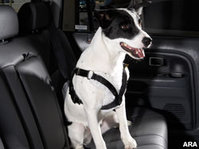
| (ARA) – Spring is here and for many pet parents that means taking their family cats and dogs for their annual veterinary check-up to ensure they are in good health and prepared for the upcoming flea and tick season. As most people with pets have experienced, leaving home and going to the veterinarian can be stressful for both pets and pet parents due to many new sights, smells, sounds and sensations. By preparing your pet for their annual visit in advance and keeping them calm during the process, the experience can be made less stressful for all. |
| It is important to help your pet adjust to traveling and the new environment of a veterinary clinic,” says Debra Nickelson, D.V.M. at Central Life Sciences. “Using pheromone-based products such as Comfort Zone can be a tremendous aid in helping dogs and cats remain calm in stressful situations.” To make the trip to the veterinarian as easy as a walk in the park, try these simple solutions: Crate comfort: Many pets, especially cats, should be placed into a crate when traveling in the car. Pet parents can make the crated car ride to the veterinarian less stressful by allowing their pet to become familiar and comfortable around the crate a week prior to the scheduled vet visit. Keep the crate out for your pet to investigate or place him in the crate for short periods of time. This will condition them to feel more at ease and will reduce his reluctance to enter and exit it on their own. Pets that are apprehensive toward riding in cars will also benefit from taking a few short rides around the neighborhood prior to a vet visit. Preparation for the car ride: Preparing in advance is the best way to ensure the ride to the veterinarian office goes smoothly. Pets may become carsick as a result of motion sickness or stress caused by being removed from their home environment. To decrease the likelihood of your pet becoming anxious or ill while traveling, pet parents should be sure their pet has recently gone to the bathroom before entering the car and has been fed at least five hours prior to the car ride. Dogs and cats should be restrained in either a travel crate or approved harness to keep pet and driver safe. Pheromone based products, such as Comfort Zone will help to calm and soothe pets having trouble coping with the stress of the car ride. “Usually my dog is a nightmare when she goes for a car ride,” says Paul Peterson, pet parent to golden retriever Bella. “I used Comfort Zone with D.A.P. spray on her collar before we left for the vet and sprayed it in my car 30 minutes before we left and I found it helped reduce her stress significantly during the car ride.” In the waiting room: Upon entering most veterinary offices, pet and pet parents must wait in an area filled with not only other pets, but a plethora of unfamiliar smells and noises. Some pets may find this situation stressful which is why it’s a good idea to keep them crated if that is how they traveled. Provide plenty of attention and praise to help them remain calm and distract them from their surroundings. To keep pets safe from other animals in the waiting room, pet parents should always make sure their dog is on a leash. During the exam: Once in the exam room, pets will likely be placed on a table to be assessed by the veterinarian. The combination of being in a foreign environment, isolated up on a table and touched by an unknown person can cause extreme levels of stress in dogs and cats. It is important to comfort your pet with petting and verbal praise to help alleviate any stress. Having a few treats on hand will also help your pet remain calm and forget about his current surroundings. Follow-up: Despite returning your pet to the comfort of their home and normal environment, many pets may continue to show signs of stress in the hours after a vet visit. If they seem anxious and whine excessively, be sure to act normal and do not to provide excessive attention as this will only reinforce their stress. If your pet is having a difficult time calming down several hours after the vet visit, provide them with plenty of exercise such as a trip to the dog park, their favorite special treat or a new fun toy. It is also important to stay home with your pet for several hours following a vet visit to help reassure him that life has returned to normal. Pet parents looking for additional tips and advice can visit www.petcomfortzone.com/behave for more information. Courtesy of ARAcontent |











